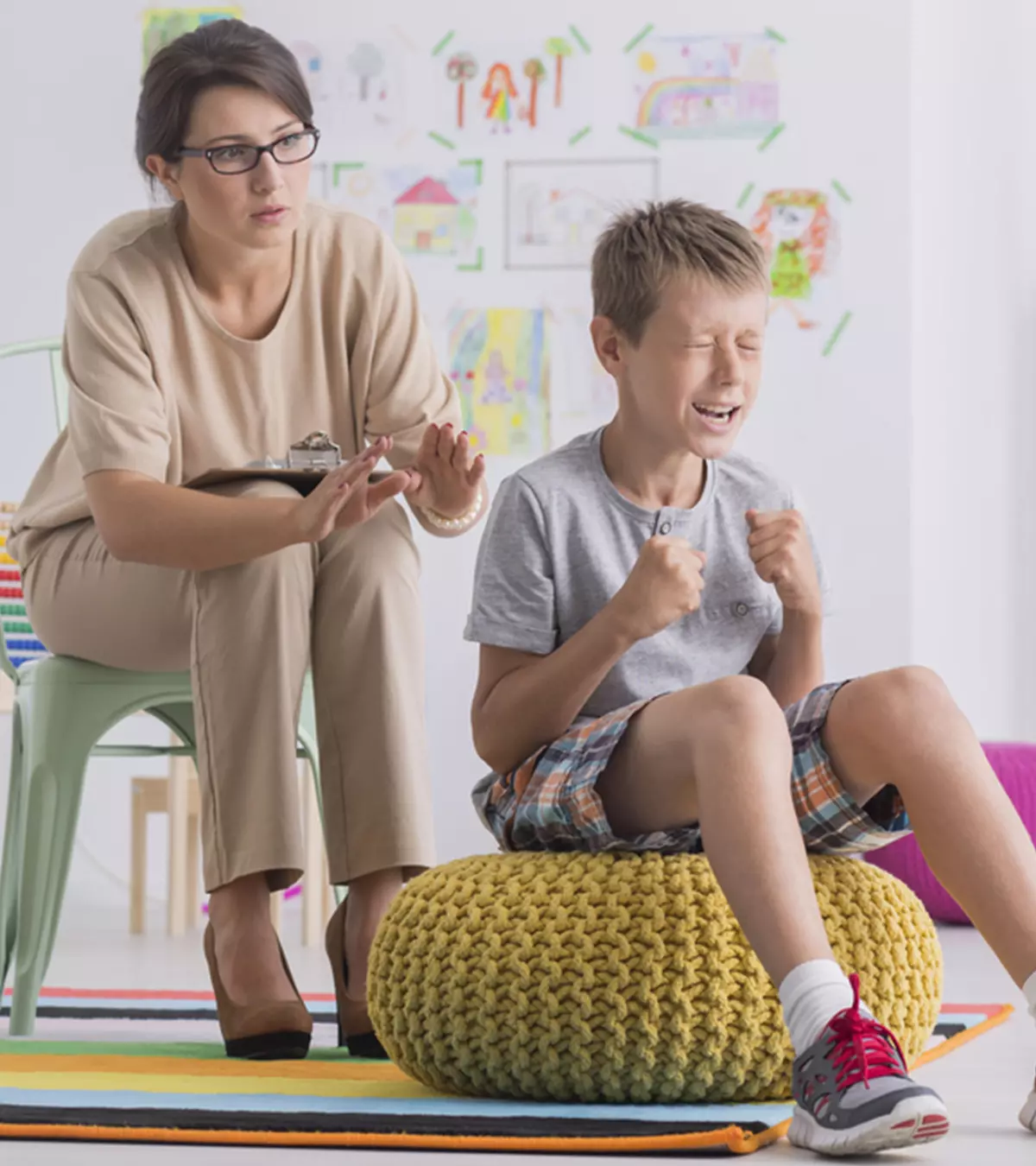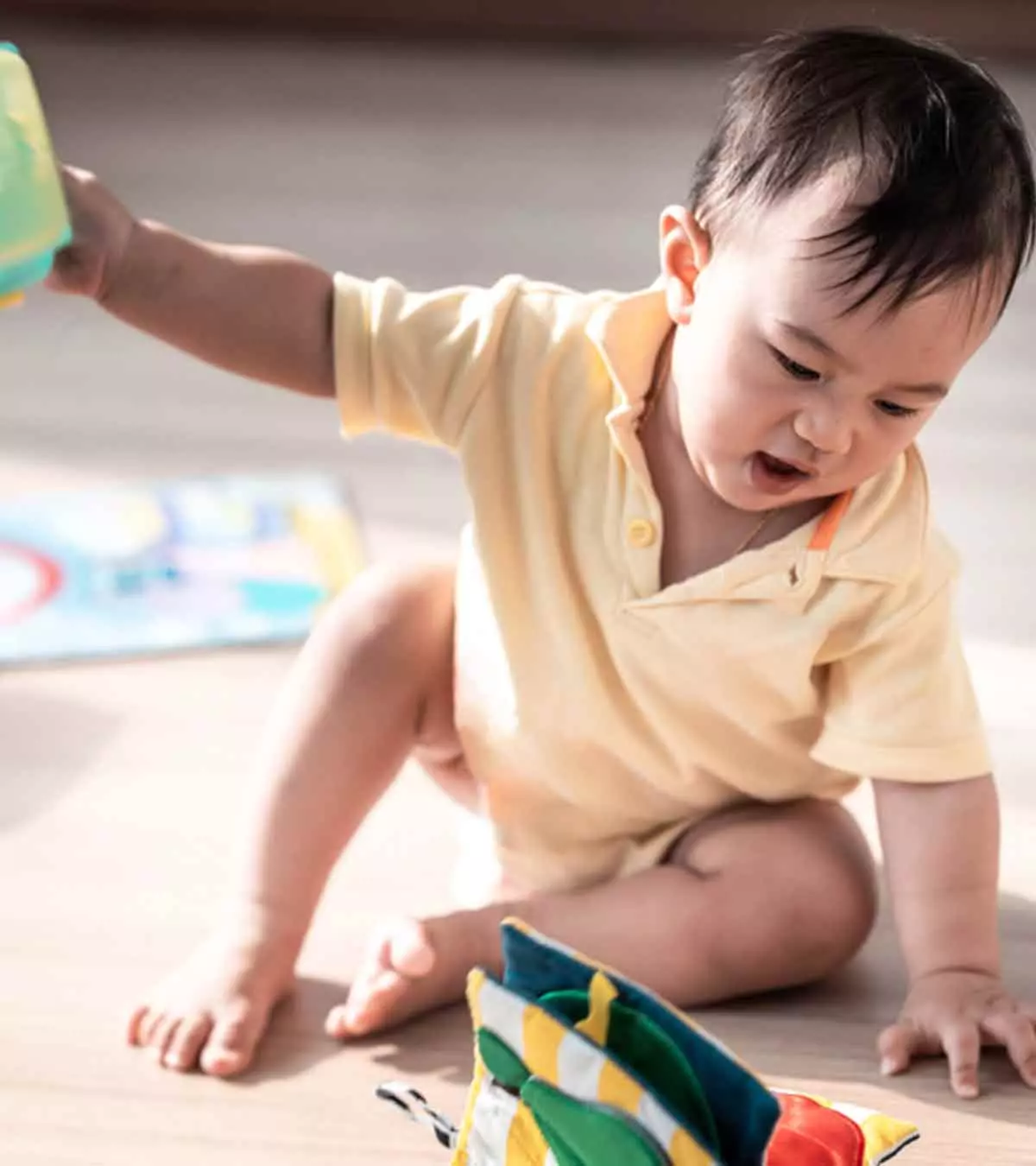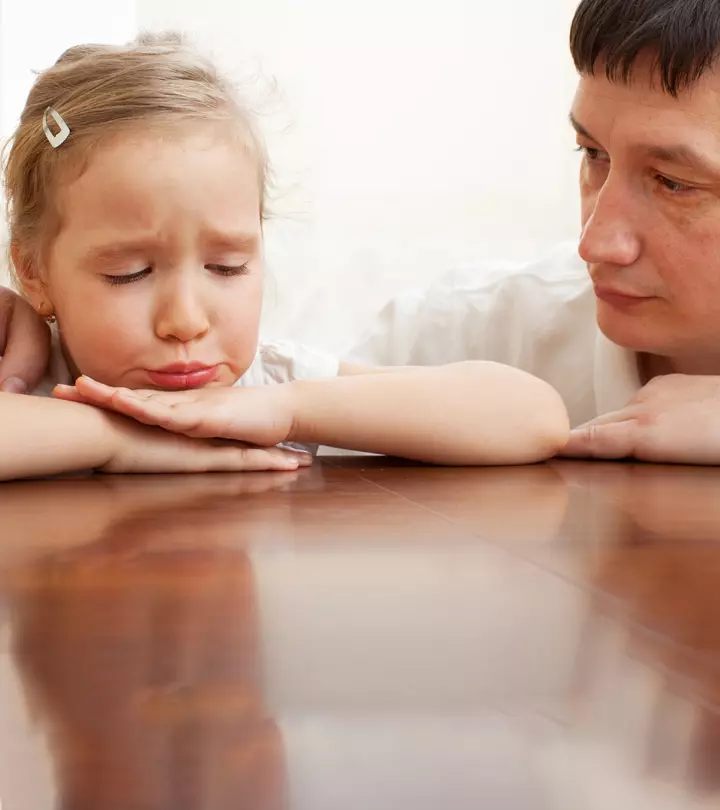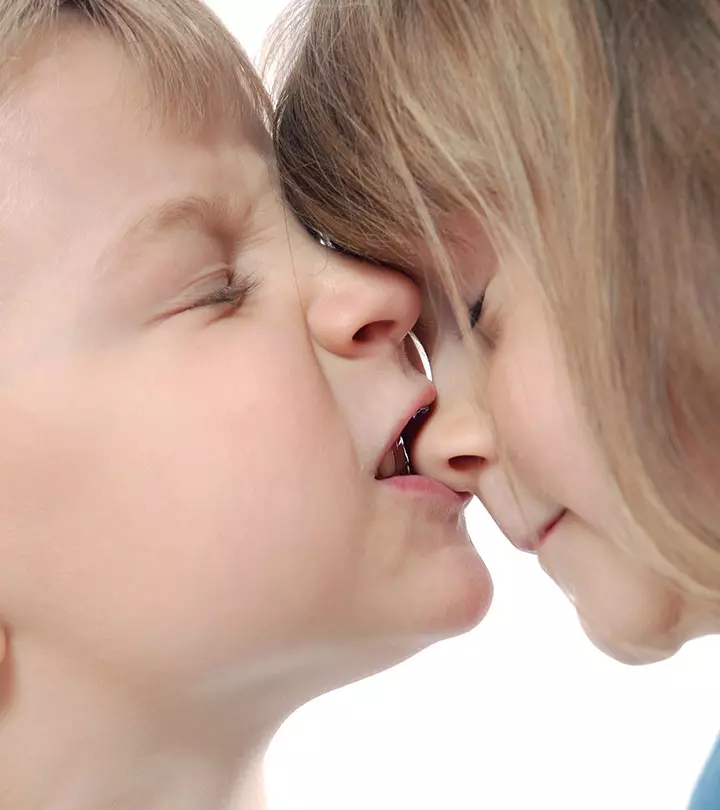
Image: Shutterstock
Jealousy is a complex, defensive reaction that may arise when one senses a threat to a valued object or relationship. Jealousy in children usually arises when the parent’s love and affection get divided with the arrival of a sibling. Fascinatingly, jealousy in children is usually associated more with the mother since many young children tend to be closer to the mother.
Jealousy is a common emotion in children, though it is one of the most unpleasant emotions they may experience. The emotion arises from the fear of losing the love and attention of their parents and caregivers. It may also cause anger, anxiety, or resentmentiHate or contempt caused by unfair treatment toward other siblings. In addition, children may have frequent disagreements or fights if they are jealous of a sibling or a friend.
Your understanding that jealousy is a natural emotion is the first step in helping your child. Read this post to learn about the common parenting mistakes that may lead to jealousy in children and how to deal with them.
Key Pointers
- The fear of losing their parents’ and caregivers’ affection and attention is the primary cause of jealousy in children.
- Parenting practices that may incite jealousy in children include over-pampering, over-protecting, authoritarian parenting, comparisons to others, inciting unhealthy competitiveness, and giving preference to children based on birth order.
- Jealousy in children may manifest as anger, anxiousness, oversensitivity, and possessiveness.
- To reduce negativity in children, encourage effort rather than envy.
- Strategies for handling jealousy in kids include paying attention to the underlying cause.
Parenting Mistakes That Cause Jealousy In Children
Parental behavior could be the trigger for jealousy in childhood. For instance, children are often eager to impress and seek extra attention from their parents. A child could gradually develop jealousy if parents always give more attention to one child than others.
Below are some of the parenting mistakes that may cause jealousy (1):
1. Too much pampering
If you spoil the child with too much pampering, they could feel unconquered at home. When a new child comes into the family or comes across a more powerful friend than them, they feel insecure. Children may feel the newborn or the friend as the reason for this insecurity. They could suffer from depression when they do not get the desired attention and may develop an inferiority complex in the future. This insecurity may also manifest as aggression in kids if not addressed appropriately.
2. Over protecting
Overprotecting the child and then releasing them from the clutches one day would mean that you are suddenly leaving them in the wilderness. They might become reserved, timidiLacking confidence or self-assurance , and shy, leading to jealousy when he sees a confident kid.
3. Authoritarian parenting

Over-controlling a child is also another mistake parents make, thereby raising jealousy in them. Setting up strict rules and regulations without explaining the cause will affect the child. They grow with lack of self-confidence and feel less worthy than their siblings or pals.
4. Comparing with others
Another dangerous mistake that parents make is comparing their children with each other. Comparisons can only lead to jealousy, rivalry, and lack of self-confidence. The child who feels belittled might become a manipulative child, as they could start coveting the success and possessions of the other child or may even develop a rancor against them.
5. Creating unhealthy competition
Making children do the same activity and comparing their results would create unhealthy competition among them. One child may be less skilled than the other, but insisting that they do the same activity with similar precision could prove wrong, leading to jealousy.
6. Birth order

Sometimes parents may pay more attention to a child based on their birth order. For instance, the first sibling might be jealous of their newly born sister or brother when they see parents paying them more attention. With the newborn’s arrival, the older children may feel dethroned, which could lead to jealousy.
Signs Of Jealousy In Childhood And Adulthood

In childhood, you may notice the signs of jealousy when your children are playing with each other. It will be so common that the jealous child might hit the other child and act like it is just a game.
Common signs of jealousy in adults and children may include (2):
- False complaints about the person they envy
- Anger
- Anxiety
- HypervigilanceiAn elevated level of alertness
- Possessive behavior
- OversensitivityiExcessive or improper immunological reactions to an antigen or allergy
- May behave annoyed, impatient, expressionless, or even step out of the situation when others receive good compliments
- Misunderstand others intentions
- Bully others
- Hostility
- Immaturity
- Paranoia or suspicion
- May explain that other’s achievements are without struggles
- May copy a person they envy but avoid them
Signs of jealousy may manifest early in childhood.
Stephanie Baer, a mother of five, noted signs of childhood jealousy in her son, Noah. Sharing her experience, she states, “We tried holding him, talking to him, distracting him with fishes, with playing, but nothing’s working. He’s even been trying to kick Weston (Winston’s brother) (i).
 Did you know?
Did you know?In adulthood, jealousy is more obvious as they talk about the other and impede their progress. Jealousy could hamper adult relations, and many of them may not feel happiness in their lives. The fears and anxiety accumulated over the years may increase the risk of certain mental disorders. You may help your child to grow out of jealousy in childhood to avoid these consequences in the future (4).
Measures To Deal With Jealousy In Children
Before dealing with jealousy in your child, be sure that you are not jealous of your siblings, friends, neighbors, or anybody else. Unless you remove it from your system, you cannot deal with it effectively in your child. Here are the ways to handle jealousy in children (5).
1. Turn envy into ambition
Diverting your child’s envy to a positive channel is a great way to reduce their negative feelings. For instance, if your child is sad because their friend received good grades, you may encourage and motivate them to study harder and score better grades. Once your child gets caught up in the attempt to study, they won’t focus on how to outrace someone. They will divert their focus in the right direction and can automatically overcome their feelings of inadequacy.
2. Listen up
In most instances, jealous and envious behavior is rooted from deep within. They have a particular issue or concern behind such behavior. Talk to your child and know the reason why they are jealous of a particular person or disgruntled about a particular situation and then listen to them. There may be cases where your child may have lower self-esteem and confidence. They may not be sure enough about their positive aspects, which may cause them to exhibit jealousy towards someone else. Create a safe, judgment-free space where they can express their emotions and talk openly about how they feel.
 Quick tip
Quick tip3. Read out from the classics

The classic stories and fables have many moral messages conveyed underneath, and even if you don’t emphasize them, your child will learn from those during the crucial stages of their development. Make bedtime reading a daily routine. Get your child more books with morals that talk about qualities like being helpful, caring and having good intentions in mind. This will help your child understand that what they’re doing is not right.
4. Explain using examples
Another great trick to emphasize the importance of having positive feelings about everyone is setting yourself as an example. Compliment others for their sense of humor, good behavior or any other quality that they may have. Be liberal in such compliments in front of your child.
5. Teach your child the importance of sharing
Children tend to hold a grudge against other children for no reason. If that’s the case, teach your little one the importance of sharing and caring. This will help them remove any insecurity. Sooner or later, you’ll find your child enjoying the company of a child they once envied. Encourage them to think about how others might feel in situations that could cause jealousy. This helps reduce jealousy and builds compassion.
6. Show love
We don’t say you don’t love your child. Instead, we emphasize that they need all the love and affection they could get during this stage of their life. No matter what the reason is, parental guidance, coupled with love and care, can always fix things up and make them the right way faster.
7. Avoid comparisons
Do not compare one child with the other, as it devalues them. It can develop long-lasting strains. These comparisons will make children conclude that “You love them more than me” or “You think they are better.” Never compare one child’s schoolwork, report cards, and test scores with their siblings or friends. They will not help your child to work harder. Instead, they fuel up resentment in them.
8. Help foster a unique strength in each child

Every child loves to hear from parents about their strengths. Talking about that particular strength will nurture their self-esteem. Help foster a unique strength in each child based on their interests and temperament. You can ask both of your children to speak words of admiration about the other so that they know what their unique strength is.
9. Reinforce cooperative behavior
It is one of the simplest ways to let go of jealousy in children. Mold them in a way that they support each other. Give them the moments to share, help, and work together and value their efforts. They will repeat these behaviors as they realize that you want them to be so.
So if you find your child jealous over their classmate’s good grades or because their big brother just got a new bike, sit with your child and remind them of the instances when they achieved something in life and were rewarded for it. Your close involvement makes a huge difference for them.
Frequently Asked Questions
1. At what age do children feel jealous?
Early signs of jealousy may be seen in infants as young as six months and become more pronounced between ten and 13 months (7).
2. Is jealousy a form of anxiety?
Jealousy may not be a form of anxiety, but it can manifest as a feeling of anxiety. Moreover, extreme jealousy may produce similar to chronic anxiety symptoms, such as increased heart rate, sweating, and fatigue (8).
3. How can I prevent my child from developing jealousy in the first place?
Jealousy is a natural emotion and avoiding it altogether may not always be possible. However, healthy upbringing techniques, such as providing individual attention to each child, encouraging open communication between children, avoiding favoritism and being fair, and avoiding comparison of children with their siblings and peers can help keep the emotions of jealousy at bay.
Jealousy in children is a common emotion, especially in children who have siblings. Children could develop feelings of envy due to various reasons and certain parenting mistakes such as constant comparisons and too much pampering. You may try tips such as diverting a child’s attention towards positive things, listening to them, and lending them your love and support. Encouraging positive behavior in children is crucial to help them overcome jealousy and develop healthier emotional responses. Also, remember that overlooking your child’s behavior could negatively impact their mental well-being and personality. So next time you see your child jealous of their peers or cousins, talk to them and motivate them to get over this negative attribute.
Infographic: Measures To Deal With Jealousy In Children
A little jealousy in children is typical. They may be envious of their siblings’ or friends’ toys and privileges. And if this jealousy continues, it can turn into intense hate and resentment, leading to problematic behaviors. So help children overcome their feelings of envy with some simple yet effective strategies. Illustration: Momjunction Design Team
Illustration: Best Ways To Deal With Jealousy In Children

Image: Stable Diffusion/MomJunction Design Team
Jealousy is a common and strong emotion that can make you do bad things. Discover tips and strategies to help you cope with jealousy and take control of your emotions.
Personal Experience: Source
MomJunction articles include first-hand experiences to provide you with better insights through real-life narratives. Here are the sources of personal accounts referenced in this article.
i.Toddler Jealous Of New Baby Brother!https://www.youtube.com/watch?feature=shared&v=4NMytTf64GU
References
1. Child Counseling: Jealousy and Envy in Kids| How to Handle Children’s Envy; My Wellness Hub
2. Dealing with jealousy; Oxfordshire County Council
3. Proximal Foundations of Jealousy: Expectations of Exclusivity in the Infant’s First Year of Life; National Library Of Medicine
4. How to Help Your Child to Deal With Jealousy; Findmykids
5. 5 Ways to Deal with Jealousy in Children; Cambridge Montessori Preschool
6. Tips for Active Listening; Centers For Disease Control And Prevention
7. Sybil L. Hart; (2016); Proximal Foundations of Jealousy: Expectations of Exclusivity in the Infant’s First Year of Life; NCBI
8. Dealing with jealousy; Health Service Executive
Community Experiences
Join the conversation and become a part of our nurturing community! Share your stories, experiences, and insights to connect with fellow parents.
Read full bio of Dr. Marwa Yahfouf
Read full bio of Sagari Gongala
Read full bio of Swati Patwal
Read full bio of Apoorva K



















